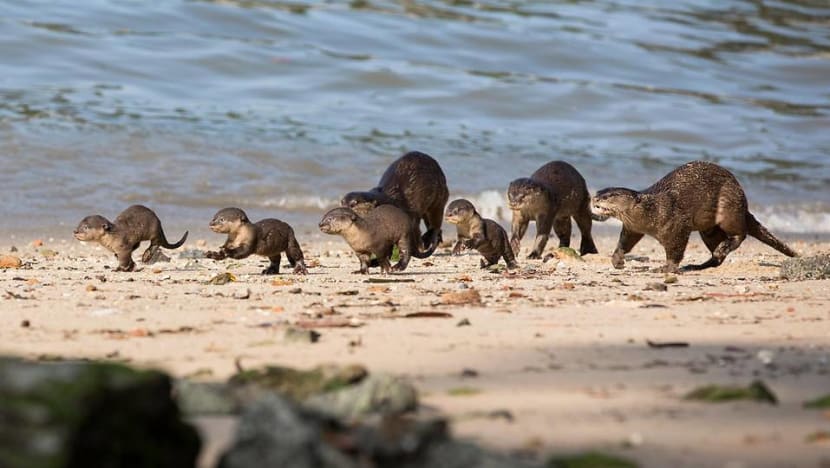Strong support for tougher wildlife protection laws in Singapore: Survey

A family of otters in Singapore. (Photo: Facebook/OtterWatch/Tan Yong Lin)
SINGAPORE: There is strong support for tougher wildlife protection laws in Singapore, according to findings from a REACH survey released on Thursday (Aug 16).
The online survey had questions drawn from amendments proposed for the Wild Animals and Birds Act (WABA) by the Wild Animals Legislation Review Committee (WALRC).
The committee, formed by Member of Parliament for Nee Soon GRC Louis Ng in February, is made up of stakeholders from the nature community, pest control companies, religious organisations, town councils and grassroots organisations.
The survey was posted on Government feedback site REACH from June to July and received over 1,000 responses and comments.
Among the findings, 81 per cent of respondents felt that the release of animals without a permit should be disallowed.
Seventy per cent felt that the feeding of wild animals should not be allowed.
READ: Pigeon population will keep growing unless people stop feeding them: AVA
According to the report, 61 per cent felt that all wild birds including crows, mynahs, and pigeons should also be protected from being killed, kept or captured without a permit.
Eighty-one per cent felt that the deployment of nets and traps outside private premises and nature reserves should be regulated.
READ: 2 otters found dead at Changi Sailing Club boardwalk
The findings also revealed 57 per cent felt that selected citizens should be given the power to assist the Government in enforcement, while 66 per cent felt that current penalties are inadequate in deterring individual offenders.
Ninety per cent felt that the penalties for repeat offenders should be more severe, and 89 per cent felt that the penalties for corporations should be more severe than for individuals.
Eighty per cent felt that organisations need to be specifically trained and licensed if they wish to provide wildlife removal services.
Eighty-three per cent supported having a code of conduct for wildlife photography, while 89 per cent wanted a code of conduct for general activities in nature areas.
READ: 540 animals born in Singapore wildlife parks in 2017
PROPOSED AMENDMENTS TO WABA
The committee proposed 10 amendments to the WABA ranging from suggestions to ban the feeding of wild animals throughout Singapore as well as banning the release of animals without a license throughout Singapore.
The initial amendments proposed by WALRC have been tweaked according to the observations gathered from the latest public feedback.
For example, the amendments included selected marine invertebrates such as horseshoe crabs and corals for protection after input from the marine biology research community.
The committee also deliberated initially on a total ban of possessing traps in public but tempered its stance after public feedback that it would be troublesome for researchers, recreational fishers and pet owners. The proposed amendment was revised to a lighter ban of deploying traps for all wild animals and birds by unqualified individuals.
During a media briefing, Mr Ng added that the amendment to prevent unauthorised trapping is targeted at poachers, who have made use of loopholes in the current version of WABA to capture certain birds.
Six species of birds, including the house crow, common mynah, and white vented mynah are excluded from current protection laws.
"A lot of times on the ground when you go to someone trapping the bird, the fellow will say, 'I'm just trapping a common mynah' and there's nothing we can do because trapping a common mynah under WABA is legal," he said.
These amendments will be subjected to further public consultation and discussions with stakeholders in October before being presented in Parliament next year.
“Currently, animals receive a full suite of protection when they are in nature reserves and national parks. The problem is that the animal loses some protection once the animal leaves the nature reserves and national parks," said Mr Ng, who also chairs the WALRC.
"This is the gap we are trying to fill in the amendments to the WABA. Ultimately, the animals don’t know where the boundaries of the nature reserves and national parks lie, and the same animal should receive the same protection regardless of where the animal is."
The proposed amendments will also align WABA with other nature-related legislation, which feature stronger penalties and protection for wildlife, Mr Ng said.
The WABA is the principal legislation that protects wildlife in Singapore and was enacted in 1965, with its last revision in 2000. While there have been seven revisions to WABA, Mr Ng said that they are "consequential revisions" to WABA due to revisions to amendments made to the Agri-food and Veterinary Authority Act, and were not specific to WABA.
"If you look at the WABA at this point, it's just focusing on kill, keep and take. But if you look at other pieces of legislation under the Parks and Trees Act, it also includes release, feed and disturb. We have the first three now in WABA, and we're trying to add three more to make sure the animal receives similar protection regardless of where the animal is," Mr Ng.
"Things have changed a lot in Singapore [since 1965]. The landscape has changed a lot. So the legislation has to be updated and changed," he added.














